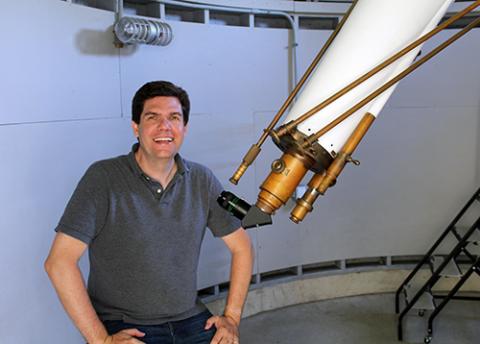Faison: Bringing the Cosmos to the Classroom

On a quiet evening, under a cloudless night sky, residents of New Haven wend their way up Prospect Street. Atop Science Hill, the Leitner Family Observatory and Planetarium awaits, couched between the stars and the hill’s grassy banks. For 13 years now, Michael Faison, lecturer in the Department of Astronomy and founding director of the observatory, has developed this space where both the Yale and New Haven communities can fix their gaze upward and learn a bit about what it means to study the cosmos.
Faison himself began his journey into astronomy looking at that same night sky, albeit a thousand or so miles south, in rural Alabama. As a child, he spent countless hours tinkering alongside his father, an electrician—together they built solar cells, motors, and ultimately, a telescope.
“The skies are really dark in the middle of nowhere,” Faison laughs, recounting how, as a young “sidewalk astronomer,” he would search for the constellations he had read about, scoping out their brightest points.
Years later, as an undergraduate at Oberlin College, Faison decided to study physics and astronomy. He continued to follow his passion for telescopes, traveling to the Arecibo Observatory in Puerto Rico to research pulsars and, one winter term, creating his own small class on telescopes to instruct other students. A penchant for teaching had already begun to emerge, one that would surface more profoundly later in his career.
After receiving his B.S. in Physics and Astronomy from Oberlin in 1994, Faison undertook doctoral work at the University of Wisconsin, conducting research at the Karl G. Jansky Very Large Array (a radio astronomy observatory) in Socorro, New Mexico. He completed his Ph.D. in Astronomy in 1999 and, after brief stints at Beloit College, Northwestern University, and Reed College, arrived at Yale in 2004.
The article reported and written by Christian Soler for the FAS Dean’s Office can be found at the link, below.
